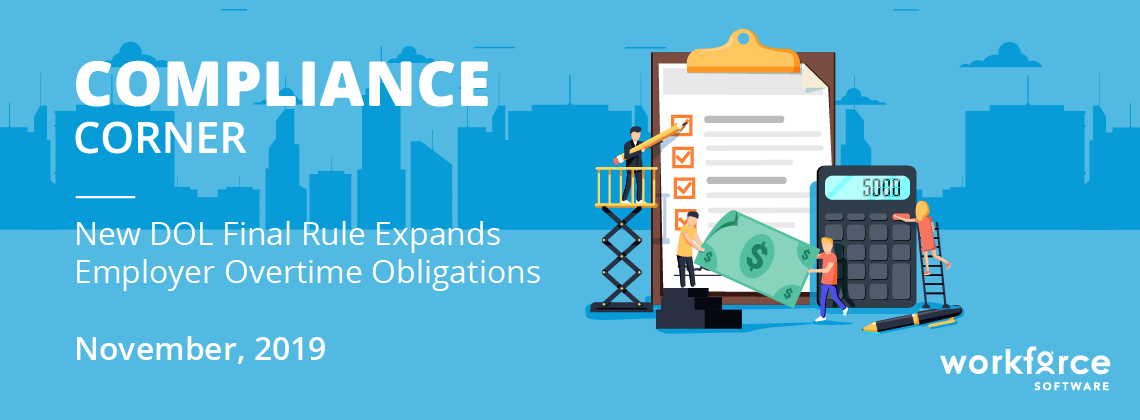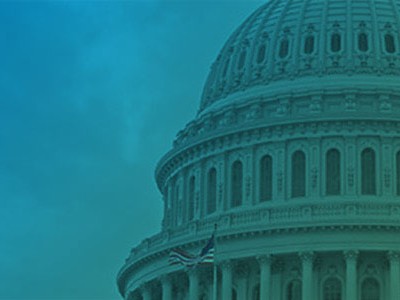New DOL Final Rule Expands Employer Overtime Obligations


Paul Kramer
Director of Compliance
In case you haven’t heard, the number of workers entitled to overtime pay in your company may soon be rising due to the recent issuance of a new final overtime rule by the U.S. Department of Labor (DOL) which is set to take effect on January 1, 2020. But what does this mean for employers? Let me explain.
Under the Fair Labor Standards Act (FLSA), employees are entitled to overtime pay at time and one-half their regular rate of pay for work hours exceeding 40 in a workweek, but there are exemptions to this requirement. Perhaps the most common overtime exemptions are the “white-collar” exemptions for bona fide executive, administrative, professional, and computer employees. To currently qualify for one of these white-collar exemptions, employees must be paid a salary of at least $455 per week (which comes to $23,660 annually) and meet certain tests regarding job duties.
The current minimum salary threshold of $455 per week for the white-collar exemptions was set in 2004. In 2016, the final year of the Obama administration, the DOL published a final rule that would have more than doubled this minimum salary threshold to $913 per week ($47, 476 annually), but left the duties tests unchanged. On November 16, 2016, however, only 10 days before the final rule’s implementation, a federal district court blocked the rule from taking effect leaving the salary threshold for the white-collar exemptions at $23, 660 per year. The Trump administration decided not to defend the 2016 final rule.
On September 24, 2019, the DOL announced a new final rule that will change the salary threshold for the FLSA white collar exemptions for the first time since 2004, as well as make other adjustments. These changes include:
Raising the salary threshold for the white-collar exemptions.
The standard salary level for the overtime exemptions for executive, administrative, professional, and certain computer employees will rise from the currently enforced level of $455 per week to $684 per week (amounting to $35,568/year for a full-year employee).

Increasing the salary threshold for exempt highly compensated employees.
Under present rules, employers may exempt certain employees from overtime under a reduced duties test if they meet a higher compensation threshold. The new final rule increases that annual threshold from $100,000 to $107,432.
Digitalize Compliance Processes to Reduce Risk
Learn more effective ways to demonstrate compliance with the complex matrix of labor laws, while also keeping costs down and reducing risks.
Bonuses and incentive payments.
Nondiscretionary bonuses, incentive payments, and commissions can be used to satisfy up to 10% of the standard salary level for exemption if employers pay those amounts annually.
U.S. territories.
Employees working in U.S. territories will also see their salary requirements rise. The new final rule sets a special salary level of $380 per week for employees in American Samoa and a special salary level of $455 per week for employees in Puerto Rico, Guam, the Commonwealth of the Northern Mariana Islands, and the Virgin Islands of the United States.
Resolving uncertainty.
The new final rule formally rescinded the 2016 final rule.
Continue to evaluate and monitor federal rules
The DOL estimates that the new final rule will make more than 1.3 million additional American workers eligible for overtime, far fewer than the estimated 4 million new workers that would have been covered under the 2016 rule. Although the new final rule is less onerous on employers than the 2016 final rule, employers must still take appropriate action to comply with the higher salary levels by January 1, 2020. This may include auditing your company to determine which employees are affected by the boost in the salary threshold to determine if affected workers should be reclassified as non-exempt, have their salaries hiked to keep them exempt, or be considered for other compensation packages. Employers should begin this evaluation now.
Finally, employers should keep up-to-date with state and local overtime laws because the DOL’s final rule only establishes federal minimums. States and municipalities are free to establish overtime standards more favorable for workers, which covered employers would have to follow. Also, continue to monitor federal rules because the DOL has indicated that it intends to adjust the salary thresholds more regularly in the future.
Subscribe to The WorkForce Blog
Learn the art and science of maintaining productive, happy, engaged employees.
More Awesome Content!
Nucleus Insights from WorkForce Customers Research Note
Nucleus Research interviews WorkForce customers who validate why we’re ranked the #1 WFM enterprise vendor for 10 consecutive years.
5 Workforce Management Secrets to Thrive in 2021 and Beyond
Download this eBook to learn the 5 secrets that will help your organization shift from surviving to thriving now and in the future and learn how the right workforce management solution can empower your initiatives.
Streamlining Complex Workforce Compliance Requirements Boosts Productivity
Discover how workforce compliance software helps EMEA organisations navigate complex legislation, enhance compliance and boost operational efficiency.




